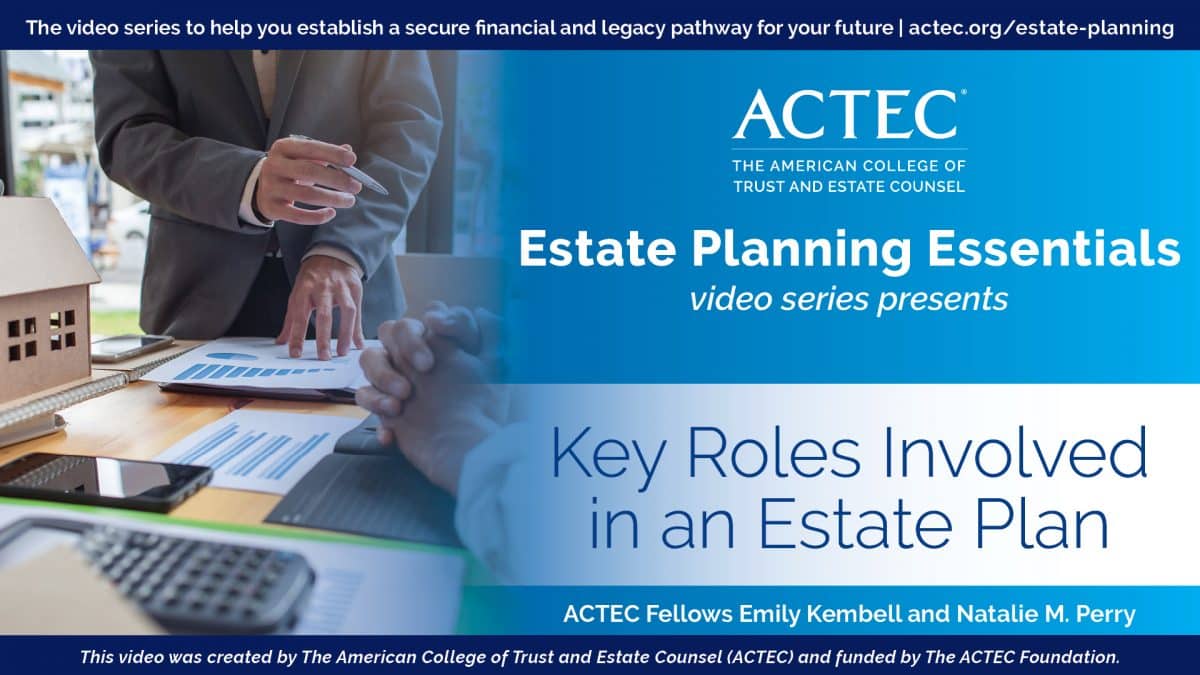Does a child have any rights to information in an estate after the death of a parent? How are assets divided up in a will or trust? Do you need a lawyer? Do you have to accept the bequeathed item?
ACTEC Fellows Eric W. Penzer and Natalie M. Perry answer these questions and more in this short video.


Transcript
Hi, I’m Natalie Perry, an ACTEC Fellow from Wheaton, Illinois.
And I’m Eric Penzer, an ACTEC Fellow from the New York metropolitan area.
Right to Information Following Death of a Relative
Natalie Perry: We’re going to talk today about your right to information when a parent or a relative dies. Erik, this question comes up a lot in practice, where even a friend of ours, an attorney, may call and say, “Someone died. I don’t know what I’m entitled to. Am I going to get a copy of anything?” What am I entitled to when someone passes away?
Erick Penzer: Generally speaking, you’re entitled to a copy of the will. The first question, though, is, is there a will at all? Not everybody needs a will and if you don’t make a will, then your property would pass pursuant to a statute in your particular state as to how assets pass absent a will. Generally, some to the wife, some to the kids; generally, that’s how it goes. If there is a will and you’re named in it, you’re going to get a copy of that will. We’re raised in this society where, you know, we look at TV, and we look at the movies, and there’s a big reading of the will in the lawyer’s office, and you have a whole cast of characters in the audience. That doesn’t happen in real life. There’s no reading of the will, usually. The executor, the person named in the will as the person responsible for probating the will and administering the estate, also called the personal representative in some states, that person is usually the first one to see the will and then he or she is responsible for filing it and giving notice to the people entitled to notice. It’s also important to recognize that a will can change throughout a person’s life, and up until the point where the person dies, it’s a private instrument. So, if you want to know what your parents are leaving you and they’re still alive, you can ask them but you’re not entitled to a copy of their will.
Responsibilities of the Personal Representative
Natalie Perry: Okay. That’s helpful. How will I know what assets are in the estate, and if I’m left with a specific asset, will I be able to request an interest in another asset? Maybe I want my mom’s house after she dies, something like that.
Erick Penzer: The personal representative of the estate has a duty to keep you reasonably informed and to let the beneficiaries know how things are moving along in the estate administration. Now, and if you make those inquiries of the personal representative and the information is not forthcoming, you have legal remedies.
There is usually a court proceeding you can bring to compel the personal representative to keep you informed. Also, at various points along the way, the personal representative may account, which means laying out all the transactions concerning the estate, all the assets of the estate, what money came in, what money went out, what’s going to be distributed, what he or she did with the money while he or she held on to it. That’s an accounting, and even if the will says there’s no duty to account, guess what? You have a duty to account, and that’s one of the paramount duties of a fiduciary, an executor or an administrator.
Now, you may not necessarily have a say in what property you get. For example, if your sister and you are each left 50% interest under the will, but there’s cash, and there’s a house, usually, it’s up to the executor to decide who gets what, and you may not get half the cash and half the house. You may get all the cash, and your sister may get the house. The question is, are what you’re both getting equal in value? And that can be the subject of disputes down the road, and litigation, perhaps.
Need of Legal Representation for Children of Deceased Person
Natalie Perry: So, I might need to get a lawyer to represent me, or does the estate lawyer represent me?
Erick Penzer: Natalie, you’re going to need a lawyer. The estate doesn’t have a lawyer. The fiduciary of the estate, the personal representative, has a lawyer. Although they refer to themselves as the estate lawyer, they’re really not. They’re representing the personal representative. You’re going to be interacting with that person. As I said, you can ask questions, you can get information, and they may offer you advice, but they’re not your lawyer. Their duty is to their client, who is the personal representative, and if you want to raise an issue, you’re going to need your own lawyer.
Natalie Perry: Okay, so what if I don’t want a bequest that’s left to me in a will?
Erick Penzer: You don’t have to take it. You know, they can’t force something on you. Now, you have to speak to a lawyer because there are certain time periods for disclaiming or saying no to your bequest; and if you do it outside of those periods, it could be a tax consequence to you, like you’re making a gift of it. The will will generally say what happens if you don’t want your bequest. It’s as if you died first, for example, if you say no to a bequest, and then it goes to whoever is next in line under the will.
Typically, it might go to your children, for example, and there may be reasons why you want to do that. Maybe you don’t want to increase the size of your estate; you’d rather just pass it to your kids, you know, in the first instance. Maybe it’s an asset you just don’t want. It’s a beat-up house that has more, you know, it’s going to cost you more to maintain it than it’s worth. Maybe you want to save, you know, the family relationship and not take something that you know everybody else wants. So, there could be reasons you still want to say no to a bequest, and you can.
Natalie Perry: Okay, Eric, thank you. That was very informative. I appreciate your time today.
Erick Penzer: You’re very welcome.
Featured Video
Key Roles Involved in an Estate Plan
An explanation of the roles and responsibilities involved in a will, trust, or estate plan such as fiduciary, agent, executor, trustee, and guardian.
ACTEC Estate Planning Essentials

ACTEC Fellows provide answers to frequently asked trust and estate planning questions in this video series.

